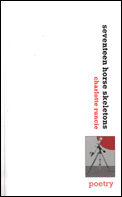I have something of a blind spot when it comes to sonnets. Good ones, that is, as opposed to clunky, goddamnit-I-WILL-write-formal-poetry efforts. Hence my confusion and quick flipping and line-counting just now, having read the blurb on the back of Charlotte Runcie's debut pamphlet that praises her sonneteering skills. The poems in question, 'Dating the Anglo-Saxon' and 'Crossed', are definitely the good kind of sonnet; they don't marinade in their form, but smuggle it in. 'Crossed' is the stronger of the two - kudos to anyone who can get "oxygenless" into iambic pentameter - tempering romantic sentiment with a lovely nerdiness, as it depicts the relationship between the marine biologist and the astronaut. My one gripe is that I wish more thought had gone into the title.
Detail is the star here. Runcie's inventive imagery is delicious but rarely overdone.
A brief soapbox interlude: titles are friends, not necessary evils (I'm talking to you, O'Hara)! This pamphlet has a great title - something I can't help thinking the Faber New Poets missed out on with their untitled collections - and one that would definitely catch my eye in a shop; it's got connotations of death, ritual, fear, magic, nature and so on, all of which give a good guide to the mischievously witchy tones within - what's not to love? Why not, then, multiply this effect by really choosing titles that make the most of every single poem in the collection? I don't mean to pick on Runcie here. Her pamphlet makes excellent use of titles in pieces like 'The Glassblower', which moors the poem subtly where it might otherwise have strayed too far into the abstract, 'Easter Eggs' and 'Samson'. 'Pope, Telescope' is patently a winner, but several headers feel like afterthoughts. 'Fur', 'Oxford Street' and 'Grotesque' all either just whip out a bit of a line or sort of don't say much, which doesn't do the piece justice.
Enough about titles. Detail is the star here. Runcie's inventive imagery is delicious but rarely overdone. She'll describe hair as a "swelling windsock" in one line, then a river simply as "wild and mad" in another; rhythm and energy are not compromised in order to cram in unnecessary metaphor. It's a balance of interesting language and restraint that many poets find hard to get right. Editorial duties at Pomegranate have no doubt helped to hone this.
It's a good move to include so many pieces that feature adventure and narrative in a small collection - it works in the way a mirror in a small room does - you go along with the speaker in poems like 'The Explorer', the sudden shift of scenery and mission quick to settle into place, and you feel the sense of danger and the threat that "they are coming soon to pull us apart". But then suddenly you're following a hunter, or watching a selkie transform, or witnessing a magician's death.
In fact, it's remarkable how the pamphlet maintains its overall coherence, what with Runcie dabbling in such contrasting themes as science and superstition, romance and earthiness, the familiar and the alien, the everyday and the legendary. There's scrambling up mountainsides and there's wishing in wells, with nothing noted as being amiss - as the speaker in 'The Seventh Winter' states, "This is how it is with us." Seventeen Horse Skeletons doesn't try too hard to make you like it. Doesn't need to. It just appears one day with its telescope and bones and, intrigued, you can't help but move a little closer.

Dr F sez: Appropriately weighted with lore and generously endowed with unusual ingredients. I've been trying to follow some of Runcie's recipes, but find I'm flat out of things like "grasping intimacy" and "weightless day". Tesco.com is more than useless.










